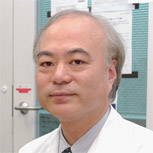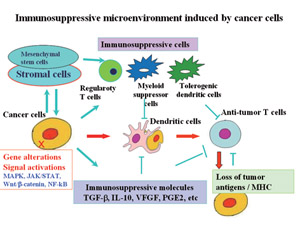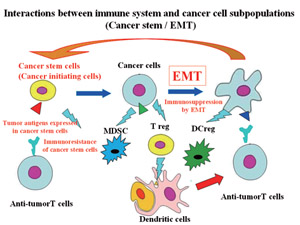HOME > Program Members > Yutaka Kawakami

Yutaka Kawakami

Professor, Division of Celluar Signaling, Institute for Advanced Medical Research, Graduate School of Medicine, Keio University
Yutaka Kawakami, MD, PhD
yutakawa@sc.itc.keio.ac.jp
http://web.sc.itc.keio.ac.jp/admedres/index-jp.html
http://esi-topics.com/melanoma/interviews/YutakaKawakami.html
Theme
In this G-COE program, we shall attempt to elucidate the molecular mechanisms underlying the interactions between the immune system and cancer subpopulations, including cancer stem (initiating) cells and cancer cells during epithelial mesenchymal transition (EMT). We are currently attempting to identify cancer stem cells and cancer antigens expressed in the cancer stem cells using a variety of techniques. One of the methods may be developed through research on the generation of melanocytes / melanoma from ES or iPS cells. The mechanisms underlying possible immunoresistance of cancer stem cells will also be investigated, since we have encountered patients showing later relapse after initially showing CR to immunotherapy. These studies on cancer stem cells may lead to the development of curative therapy for cancer. EMT is an essential phenomenon for cancer cell metastasis through decrease of the adhesive activity and increase of the invasive ability of cancer cells. We have recently found that EMT induces immunosuppression / resistance, which would further promote metastasis. We shall attempt to clarify the molecular mechanisms underlying the immunological effects of EMT. We shall also investigate the roles of tumor-associated stromal cells, including mesenchymal stem cells, in the generation of an immunosuppressive tumor microenvironment. These studies may be expected to not only result in progress in the understanding of the immunobiology of cancer cells, but also in the development of more effective cancer therapy.
Research activities
We have been attempting to reveal the interaction between cancer cells and the immune system, including the various immune cells and their network. To develop effective immunotherapy, we have identified various human cancer antigens, evaluated them in clinical trials of various types of immunotherapies, and attempted to identify problems in each of the steps towards immunological cancer rejection. Based on the results of these studies, we have demonstrated that one of the major problems that needs to be addressed is the systemic and local immunosuppressive / resistant condition in cancer patients. We then clarified some mechanisms of cancer cell-induced immunosuppression, including induction of various immunosuppressive cytokines and cells through constitutively activated signals triggered by cancer cell gene alterations, such as activated MAPK, JAK/STAT, NF-kB, and Wnt/β-catein signalings. Human cancer tissues are composed of heterogeneous cell populations. We have recently found that cancer subpopulations, including cancer stem (initiating) cells and epithelial mesenchymal transition (EMT) cancer cells, have unique roles in the development of immunosuppression / resistance in cancer patients, and further investigation in the appropriate direction may lead to the development of more effective cancer therapy.

Fig.1 Immunosuppressive microenvironment induced by cancer cells
Cancer cells induce immunosuppression in both the induction and effector phases of antitumor immune responses, through induction of various immunosuppressive cytokines and cells caused by altered signaling in the cancer cells

Fig.2 Interactions between immune system and cancer cell sub-
populations (Cancer stem / EMT)
Human cancer tissues consist of heterogeneous cancer cell populations. Among them,cancer stem (initiating)cells and epithelial mesenchymal transition (EMT) cancer cells have unique roles in the development of immunosuppression / resistance in cancer patients.
Selected Paper
- Kawakami Y, Eliyahu S, Delgado CH, Robbins PF, Rivoltini L, Topalian SL, Miki T and Rosenberg SA. Cloning of the gene coding for a shared human melanoma antigen recognized by autologous T cells infiltrating into tumor. Proc Natl Acad Sci USA.91(9):3515-1519,1994
- Rosenberg SA, Yang J, Schwartzentruber D, Hwu P, Marincola F, Topalian S, Restifo N, Dudley M, Schwarz S, Spiess P, Wunderlich J, Parkhurst M, Kawakami Y, Seipp C, Einhorn J and White D. Immunologic and therapeutic evaluation of a synthetic peptide vaccine for the treatment of patients with metastatic melanoma. Nat Med.4(3):321-327,1998
- Udagawa M, Kudo-Saito C, Hasegawa G, Yano K, Yamamoto A, Sumimoto H, Yaguchi M, Toda M, Azuma I, Iwai T, Kawakami Y. Enhancement of immunologic tumor regression by intratumoral administration of dendritic cells in combination with cryoablative tumor pretreatment and Bacillus Calmette-Guerin Cell Wall Skeleton Stimulation. Clin Cancer Res.12(24):7465-7475,2006
- Sumimoto H, Imabayashi F, Iwata T, Kawakami Y. The BRAF-MAPK signaling pathway is essential for cancer immune evasion in human melanoma cells. J Exp Med.203(7):1651-1656,2006
- Kudo-Saito C, Shirako H,TakeuchiT, KawakamiY, Cancer Metastasis Is Accelerated through Immunosuppression during Snail-Induced EMT of Cancer Cells, Cancer Cell, 15(3):195-206, 2009
Copyright © Keio University. All rights reserved.
